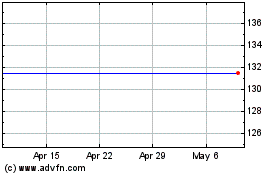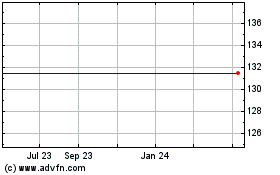China's Internet giant, Alibaba Group Holding Ltd., is promising
wholesale changes to how it tackles fake branded goods on its
shopping platforms amid controversy over its admission to an
anticounterfeiting group and ahead of a looming crackdown on
e-commerce knockoffs by Chinese authorities.
The new measures include quicker removal of infringing listings,
according to Alibaba. In addition, Alibaba says it will now shift
the burden of proof to sellers on its platforms to show that their
goods are authentic.
Alibaba's China marketplaces handled $485 billion in merchandise
volume in the financial year ended March 31, which analysts
estimate is more than Amazon and eBay combined. But it has long
been dogged by complaints from brands that its sites are rife with
fakes, which drive customer traffic that in turn could profit
Alibaba.
Controversy flared over Alibaba's admission last month to the
International AntiCounterfeiting Coalition, one of the world's
largest groups dedicated to fighting fake and pirated goods.
U.S. fashion brand Michael Kors Holdings Ltd. and Gucci America,
Inc., the latter owned by France's Kering SA, withdrew from the
Washington, D.C.-based trade group because of concern over
Alibaba's commitment to fighting counterfeits, according to people
familiar with the matter. Both companies declined to comment.
Tiffany & Co. quit the IACC this week but it didn't say why
it left. The U.S. jeweler didn't respond to queries.
French luxury brand Longchamp has told the IACC that it will not
attend the group's annual conference next week, where Alibaba's
co-founder Jack Ma is the keynote speaker, and that withdrawing its
membership "might become an option" if IACC continues to affiliate
with Alibaba without consulting its members, according to a letter
to the anticounterfeiting group reviewed by The Wall Street
Journal.
An Alibaba spokeswoman declined to comment on the departure of
the brands from the anticounterfeiting group.
Michael Evans, Alibaba's president, said in a blog post Thursday
that the company is "part of the solution, and we will continue to
cooperate with brands and industry associations, rather than
resorting to unproductive tactics" to fight counterfeits.
The IACC has previously said that its board—including Tiffany
& Co.— voted unanimously in favor of admitting Alibaba as the
first member of a newly created category for intermediaries and
that it "stands by its decision" because marketplaces must be part
of the effort to combat fakes online.
In a statement Wednesday, the IACC didn't comment on the
jeweler's withdrawal but said it plans to "review all of our
policies and procedures to confirm that they meet the highest
standards and that our corporate governance fits the size and scope
of the IACC we have become."
China's State Administration for Industry and Commerce is about
to begin a campaign this month to step up policing of e-commerce
sites, according to a report in the state-run People's Daily
newspaper. The regulator said that it would severely punish those
who violate regulations governing fake or shoddy goods and
fictitious sales online by merchants seeking to increase their
visibility on e-commerce platforms.
Chinese e-commerce companies including Alibaba and its biggest
rival, JD.com, may get more regulatory scrutiny because of their
size, according to Duncan Clark, the author of " Alibaba: The House
that Jack Ma Built."
Alibaba said the company welcomes measures that promote a
"healthy environment for e-commerce development." JD.com said it
isn't worried about the scrutiny because it doesn't have a
consumer-to-consumer marketplace, an online space where it said
counterfeits dominate.
As part of its new efforts against piracy, Alibaba and the IACC
this week announced they would expand their joint program to remove
counterfeits quickly from the Chinese e-commerce company's sites,
including Taobao and Tmall. The program, MarketSafe, will now be
open to all brands, free of charge. Previously, it was only
available to members of the anticounterfeiting coalition, and cost
thousands of dollars a year.
Separately, Alibaba also plans to filter listings that could be
for counterfeit goods and send them to brand owners for
verification, according to people familiar with the plan. Brands
may still have to file a request for Alibaba to take down the
listings, however, people familiar with the matter said.
Meanwhile, Alibaba has publicly notified sellers of luxury goods
on Taobao, a virtual bazaar where almost anyone can open up a
storefront, that starting May 20 they will need to upload proof
such as an invoice or letter of authorization to sell branded
goods.
Mr. Clark, the author, said Alibaba's latest measures could be
some of the "most significant" moves the e-commerce giant has taken
so far to tackle the problem, but said it remains to be seen how
they're implemented, a view echoed by others.
Dean Arnold, a co-founder of The Intellectual Property Group,
which advises more than 20 brands, said, "Previous Alibaba
initiatives have sounded great on paper too, but eventually fallen
short."
Alibaba has said that its efforts are making a dent on
counterfeit sales on its platforms. The program with the IACC has
led to the closure of more than 5,000 online storefronts and
removal of over 180,000 infringing product listings over two years,
it said.
Some large brands have told the Journal that these numbers pale
in comparison to the number of listings and shops they have
individually managed to investigate and force Alibaba to remove
from its sites over the same period.
Write to Kathy Chu at kathy.chu@wsj.com
(END) Dow Jones Newswires
May 13, 2016 05:45 ET (09:45 GMT)
Copyright (c) 2016 Dow Jones & Company, Inc.
Tiffany (NYSE:TIF)
Historical Stock Chart
From Mar 2024 to Apr 2024

Tiffany (NYSE:TIF)
Historical Stock Chart
From Apr 2023 to Apr 2024
